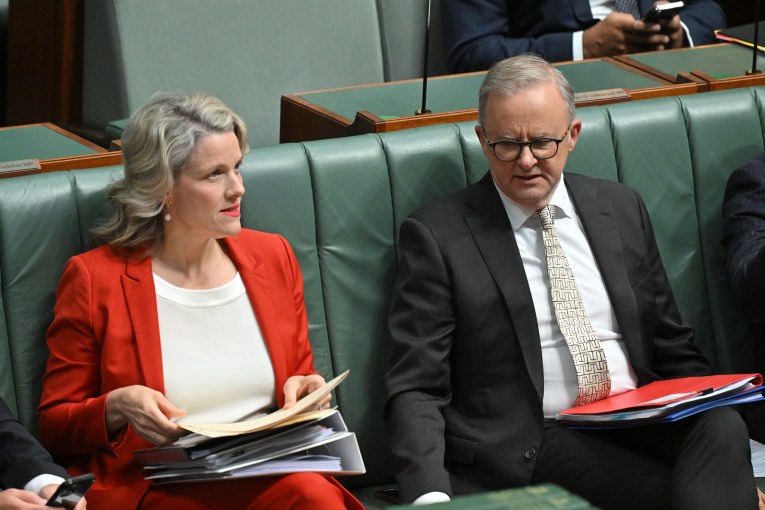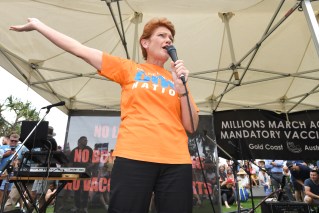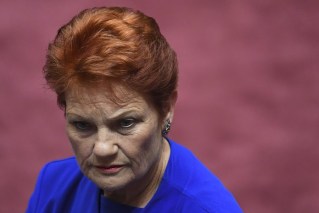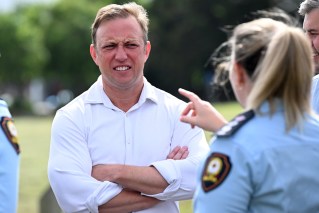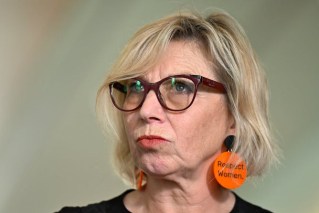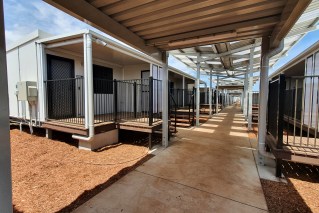‘Highway to Hell’ – World leaders say summit about battle for human survival
World leaders and diplomats have framed the fight against global warming as a battle for human survival during opening speeches at the COP27 climate summit in Egypt.

French President Emmanuel Macron reads his notes as he waits to speak at the COP27 U.N. Climate Summit, Monday, Nov. 7, 2022, in Sharm el-Sheikh, Egypt. (AP Photo/Nariman El-Mofty)
The head of the United Nations declared a lack of progress so far had the world speeding down a “highway to hell”.
The stark messages – echoed by the heads of African, European and Middle Eastern nations – set an urgent tone as governments began two weeks of talks in the seaside resort town of Sharm el-Sheikh to figure out how to avert the worst of climate change.
“Humanity has a choice: co-operate or perish,” UN Secretary-General Antonio Guterres told delegates, urging them to accelerate the transition from fossil fuels and speed funding to poorer countries struggling under current climate impacts.
Despite decades of climate talks, countries have failed to reduce global greenhouse gas emissions, and their pledges to do so in the future are insufficient to keep the climate from warming to a level scientists say will be catastrophic.
Land war in Europe, deteriorating diplomatic ties between top emitters the United States and China, rampant inflation and tight energy supplies threaten to distract countries further away from combating climate change, Guterres said.
“Greenhouse gas emissions keep growing, global temperatures keep rising and our planet is fast approaching tipping points that will make climate chaos irreversible,” he said.
“We are on a highway to climate hell with our foot on the accelerator.”
Former US Vice President Al Gore, also speaking at the event, said global leaders have a credibility problem with climate change and criticised developed nations’ ongoing pursuit of gas resources in Africa, which he described as “fossil fuel colonialism”.
“We have a credibility problem all of us,” Gore said.
“We’re talking and we’re starting to act but we’re not doing enough.”
French President Emmanuel Macron said while the world was distracted by a confluence of global crises, it was important not to sacrifice national commitments to fight climate change.
“We will not sacrifice our commitments to the climate due to the Russian threat in terms of energy, so all countries must continue to uphold all their commitments,” he said.
British Prime Minister Rishi Sunak said the war was a reason to accelerate efforts to wean the world off fossil fuels.
“Climate security goes hand in hand with energy security,” he said.
“Putin’s abhorrent war in Ukraine and rising energy prices across the world are not a reason to go slow on climate change. They are a reason to act faster.”
While leaders tended to agree on the risks of global warming, their speeches revealed huge rifts, including over whether fossil fuels could play a role in a climate-friendly future and who should pay for climate damage that has already occurred.
Immediately after Guterres’ speech urging an end to the fossil fuel era, United Arab Emirates President Sheikh Mohammed bin Zayed al-Nahyan said his country, a member of the Organization of the Petroleum Exporting Countries, would continue to produce them for as long as there is a need.
“The UAE is considered a responsible supplier of energy and it will continue playing this role as long as the world is in need of oil and gas,” he said.
The UAE will host next year’s UN conference, which will attempt to finalise agreements made last year in Britain and at this year’s Egyptian talks.
Many countries with rich oil, gas and coal resources have criticised the push for a rapid transition away from fossil fuels, arguing it is economically reckless and unfair to poorer and less developed nations keen for economic growth.
“We are for a green transition that is equitable and just, instead of decisions that jeopardise our development,” said Macky Sall, president of Senegal and chair of the African Union.
Poorer countries that bear little responsibility for historic carbon emissions have also been arguing they should be compensated by rich nations for losses from climate-fuelled disasters including floods, storms and wildfires.
